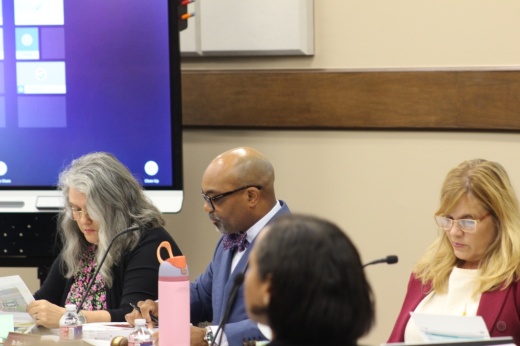However, the district is projected to face a looming shortfall once the one-year “disaster pennies” measure expires ahead of the 2026-27 school year, Chief Financial Officer Bryan Guinn said at the June 9 agenda review meeting.
Board President Kristin Tassin said the board may have to consider a Voter Approval Tax Rate Election, or VATRE, in 2026 to make the tax increase permanent to remain competitive in services and salary offerings.
“We're in the unenviable position of having to balance not wanting to raise taxes for our community, but also wanting to ensure that we are taking care of our employees,” Tassin said. “Part of the fix may be a VATRE and some of these pennies may have to go permanent and we need to be prepared for that.”
The proposal
During the 89th Texas Legislature, Guin said FBISD received $40 million to fund raises through 2027, including:
- $2,500 for teachers with more three to five years of experience
- $5,000 for teachers with more than five years of experience
- $515 for non-administrative staff
Outside of state funds, the raises for staff not covered by House Bill 2—including first-year teachers and support staff—rely on the temporary use of the seven “disaster pennies” in the tax rate—a one-time board-approved tax increase allowed by the state following Hurricane Beryl in 2024, Guinn said.
Guinn said the seven disaster pennies are projected to generate $35.7 million necessary to fund the compensation increase proposals.
“It does require the use of those seven pennies,” Guinn said. “Without them, the district would face a $12.9 million deficit and fall short of the board-mandated 90-day operating reserve.
While the board will vote on the budget itself on June 23, adopting it would effectively commit the district to approve the higher tax rate in September, Guinn said.
Zooming out
Even with the use of disaster pennies, the temporary increase from $0.99 to $1.06 per $100 valuation will still leave Fort Bend ISD’s rate lower than nearby districts such as Cy-Fair, Katy and Lamar Consolidated ISDs, Guinn said.
With legislative changes increasing the homestead exemption and compressing school tax rates, most FBISD taxpayers with an average valuation of $429,910 will still see a net savings of $194 on their annual tax bill, despite the temporary hike, Guinn said.
What they’re saying
The use of disaster pennies helps the district end the 2025-26 school year with a $7.5 million surplus, maintaining its 90-day reserve, Guinn said. However, with the expiration of disaster penny revenue for the 2026-27 school year, district officials project a $26.2 million shortfall and a drop to a 78-day operating reserve, below the board’s threshold, Guinn said.
Based on Population and Survey Analyst estimates, if enrollment declines by 2%, the projected shortfall could balloon to $35.4 million and reduce the operating reserve to 73 days, Guinn said.
Many trustees, including Angie Hanan, raised concern that much like relief funds granted after the 2020 pandemic, these emergency pennies are temporary and will not sustain long-term compensation plans.
“This is a one-year fix—just like [the Elementary and Secondary School Emergency Relief Fund] was,” Hanan said. “What happens after the disaster pennies are gone?”
Tassin also said the district has struggled to remain competitive in both salaries and services due to a significantly lower tax rate compared to neighboring districts that offer higher starting teacher salaries.
“I don't want to talk about raising taxes,” she said. “But, I think we have to look at it and be realistic about it, and we have to take care of our people.”
Moving ahead
Superintendent Marc Smith said the district is already working on strategies to mitigate the projected shortfall for the 2026-27 school year, including analyzing vacant positions, trimming administrative costs and reevaluating long-term financial plans.
“As we were trying to solve some very difficult problems, we knew doing nothing was not something that would pass the test for us,” he said.
The board is set to vote on the proposed budget June 23, followed by a September tax rate hearing, where the tax rate for the 2025-26 school year will be set.





